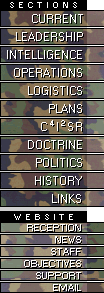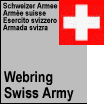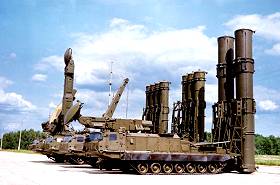





Russia to meet Syrian requirements in defence weapons
June 16, 2001

ast month, May 24th, Deputy Prime Minister Ilya Klebanov received the Syrian defence minister, who was visiting Moscow. Prior to this, the Syrian defence minister had met with his Russian counterpart Sergey Ivanov. The talks discussed military-technical cooperation, which both sides have an interest in reviving.
The Syrian army is currently 90-per cent equipped with Soviet hardware, of which almost 80 per cent requires renewal. Following the collapse of the USSR, military-technical cooperation with Syria declined. Before this visit it was unclear which option Damascus would prefer - upgrades or new purchases. The current talks have made it possible to clarify Syria's intentions.
Marshal Mustafa Talas brought two lists to Moscow. One of them records the Russian military hardware in use by the Syrian army and in need of upgrading. This includes S-200E surface-to-air missile systems, T-55 and T-72 tanks, BMP-1 infantry fighting vehicles, MiG-25 interceptors, and MiG-29 fighters. But Damascus did not limit itself to this alone.
Moscow was also given a list of modern arms and military hardware that Syria would like to acquire. These include eight Iskander-E operational-tactical missile systems, 30 Su-30 fighters, the S-300PMU-1, Buk-M1, and Tor-M1 surface-to-air missile systems, the Mi-35 and Ka-52 combat helicopters, and the Project 12418 and 12421 Molniya combatant craft. Moreover, Damascus expressed a desire to train its military personnel (up to 100 men a year) at Russian military academies and schools.
Moscow can expect to earn more than 1bn dollars as a result of the implementation of these plans for upgrades and deliveries of military hardware. Russia needs to resume large-scale military-technical cooperation with Syria - it should help Moscow pass the target set by President Putin for 4bn dollars worth of arms sales this year.
During the talks, Marshal Talas voiced concern about the military-technical cooperation between Moscow and Tel Aviv. Last year, Russia launched the Israeli EROS-A1 spy satellite from the Svobodnyy space centre and announced the possible launch of seven further satellites. With the help of that satellite Israel has been able to conduct round-the-clock monitoring of all Near East countries.
In response to this rebuke, Moscow proposed that three-to-five of the 30 MiG-25's due to be upgraded be reconfigured by Damascus as the MiG-25RE export-version high-altitude intelligence-gathering aircraft, which will allow Damascus to carry out airborne reconnaissance of Israeli territory with impunity. To which Marshal Talas agreed.
Text source: Kommersant, 25 May 2001
© 2001 CheckPoint |














